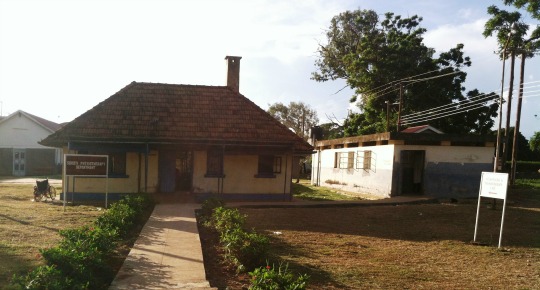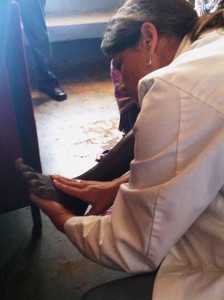Editors’ Note: This summer, six students from Albert Einstein College of Medicine will travel to Soroti, Uganda, to treat diabetes as part of Einstein’s Global Diabetes Institute (GDI). During this period, we will run a series of posts detailing their challenges and progress. In this post, the institute’s program manager, Anneka Wickramanayake, explains the missions and goals of the GDI in Uganda. The trip was funded by Einstein’s Global Health Fellowship Program.

Department of Physiotherapy at Soroti Regional Referral Hospital (SRRH) in Soroti, Uganda
By Anneka Wickramanayake, M.P.H.
“This was extremely educative and humbling, to be honest we thought we knew diabetes but we realized there is more and more to be learnt in this new epidemic of diabetes mellitus…We as a hospital seriously want to champion DM [diabetes mellitus] research in Uganda and Africa, we already have a list of research topics that we hope to do in the near future.”
Those are the reflections of Drs. Wilson Etolu and Joseph Epodoi, two clinicians from Soroti Regional Referral Hospital in Soroti, Uganda. They practice in one of Uganda’s poorest districts, population 60,000. The doctors’ perceptions about managing diabetes changed considerably after attending an intensive training course in comprehensive diabetes management held at Christian Medical College (CMC) in India.
This particular course educates and trains physicians to provide high-quality diabetes care in resource-limited settings. Though diabetes treatment knowledge and information are widely known among doctors in the West, and at comprehensive facilities such as CMC, there’s much to learn. The goal of the CMC intensive is to provide doctors with the knowledge and tools to develop and offer high-caliber care at the diabetes clinic in Soroti. Bolstered by the training and experiencing first-hand the high-caliber care being offered at CMC, these doctors returned to Soroti with new energy to develop their own diabetes clinic.
Enter the Einstein GDI

Dr. Leigh Perreault, associate professor of medicine at the University of Colorado, Division of Endocrinology Metabolism and Diabetes checks the foot of an SRRH patient. Dr. Perreault is a partner of the Global Diabetes Institute.
CMC has close research ties to Einstein. Aiming to address the rapidly growing global epidemic of diabetes, the GDI has fostered a triangular partnership with CMC and Soroti Hospital.
Diabetes has traditionally been considered a disease of the developed world; however, this is a misconception. A staggering 80 percent of new cases of diabetes are in low- and lower-middle-income countries. In Africa, approximately 19.8 million adults have diabetes, and projections for 2035 are as high as 41.1 million. The health and economic burdens of this epidemic are crippling. Our mission is to help alleviate this through visits from our staff and now our students.
The staff of Soroti Hospital is also committed to this mission, and wants to address the epidemic on a local level. But the hospital faces numerous challenges that include the burden of a large patient population and a scarcity of resources.
How Einstein Students Will Help in Uganda
To date, the Einstein program has sponsored four Soroti clinicians’ participation in the CMC training course and facilitated their formulation of longterm goals for diabetes care in Soroti. Now we will support their efforts by working on the ground, with six Einstein first-year medical students traveling to Soroti for five weeks this summer to provide assistance. The hospital staff has established clear, attainable objectives for improving the diabetes ward; the students will help them achieve these goals. The project has three main areas of focus:
- Data Collection: To date, there have been no national surveys published on diabetes in Uganda. We will gather local data on the prevalence of diabetes and its risk factors so interventions can be appropriately designed and their progress monitored.
- Education: The issues surrounding diabetes—its risk factors and its treatment—are still new to many people in Uganda. We hope to diminish the risk factors by increasing understanding among the general public and health practitioners. We will help by designing a curriculum and disseminating it throughout the region.
- Prosthetics Workshop: Many people in the Soroti region have had amputations due to diabetes, injury and other complications. Their quality of life is seriously diminished post amputation due to loss of mobility. Many of the patients die within the first year. Additionally, a prosthetic limb in Uganda costs between $250 and $500, which is prohibitive for most in a country where the median income is about $650 per year. We will determine the feasibility of using low-cost methodologies in Soroti, so more people can benefit from lifesaving prosthetics.
Despite the challenges the hospital faces, we are continually impressed by the staff’s passion and dedication to making positive changes. Students this summer will help kick-start these vital projects.
You can follow our progress through periodic posts on The Doctor’s Tablet, and on the GDI website.

